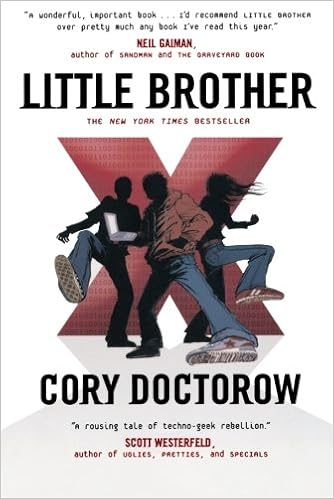 When Marcus skipped school to play an ARG (Alternate Reality Game) with his friends, the worst he thought could happen was to get expelled. But when a terrorist attacks San Francisco, thousands are killed and Marcus and his friends are scooped up by Homeland security and interrogated as terrorists.
When Marcus skipped school to play an ARG (Alternate Reality Game) with his friends, the worst he thought could happen was to get expelled. But when a terrorist attacks San Francisco, thousands are killed and Marcus and his friends are scooped up by Homeland security and interrogated as terrorists.
When he’s released the world is very different. No longer are citizens able to move about San Francisco without being watched by the government. Activity is tracked, people are followed, and freedom as Marcus knows it is dead. And to top it all of, his best friend Darryl is either still being held by DHS, or dead.
It’s a post 9/11 world to the extreme, where Homeland Security has beefed up surveillance to try to prevent the next attack from happening. Marcus and his friends start their own form of rebellion using low budget hardware and open source encryption software, but it’ll take more than a few downloads to outsmart the Department of Homeland Security and save Darryl.
Characters
Marcus is your run-of-the-mill smart ass teenager. He flows from situation situation projecting confidence, even if he’s about to pee his pants. His loyalty and stubbornness are some of his most well developed characteristics but it’s his fear that really sold me. He’s facing down a huge government agency, but instead of being care free and defiant all the time, he cracks and doubts himself in a way that many protagonists don’t in many of the books I read.
Unfortunately some of the other characters are not quite as nuanced. Some are clearly stereotypes while others are straight propaganda. For example, Marcus‘ father, who we would believe to be a proponent of free speech as a member of a prestigious university, is one of the most vocal supporters of the DHS is attempts to crack down civil liberties. I know the point was to provide a devil’s advocate, but it was a bit heavy handed at times.
Plot
Little Brother is a constant struggle between the government and Marcus and his band of friends. As you’d expect, our loveable underdogs have a huge disadvantage, and they do a fantastic job of using what’s at their disposal to hit back where they can.
<Spoiler>The only problem is that nothing they do actually matters. Its all well and good that they build up the XNet and get people together for events, but ultimately the novel is resolved by an investigative journalist. Marcus actually fails spectacularly in almost every way, yet somehow still wins. I’m guessing this is meant to be some kind of commentary on how this type of crisis should be resolved, but from a narrative perspective it left me wanting more.</Spoiler>
Setting
I was actually very impressed with the way that the situations in Little Brother aligned to real world technologies. In particular, the use of low grade hardware and open source encryption algorithms were very well done. Doctorow clearly has a background in tech, and he uses it to guide the reader along in an easy to understand way. That said, the plot itself does rely on this technology, so if you don’t grasp the concepts, you’ll be left wondering why things happened the way they did.
The setting also seemed a bit over the top with how the surveillance and technology is portrayed. Granted, I probably should have expected this with a title like “Little Brother” but there was much more conspiracy doom and gloom than I normally like. I skipped over a few sections because they were clearly preaching about the evils of government surveillance. Had it been a bit less on the nose, I think I’d have been fine with the theme, but as it stands I think it took away from the narrative.
Tone/Voice
The tone of the novel was pretty dark. Its main theme of government surveillance and loss of freedom hits pretty close to home given today’s political climate, so if you’re looking for something with sunshine and rainbows I’d recommend a different book.
Depending on what side of the spectrum you land on you’re probably either agree with most of the things that are said or you’ll think that is so far-fetched that it’s it takes you out of the novel. Either way I could see this being a very polarizing town but one that I think will spark discussion down the road.
Fun factor
As a geek myself, I really enjoyed the deep dive into the technology and the way it impacted Marcus and his friends. Their use of the XNet and references to things like LARPing made it more than the standard hacker novel, but it stayed grounded enough that I felt like it was still a good representation of how security technology truly works. And while the ending didn’t leave me particularly satisfied on an emotional level, I did have a good “stand up and cheer” moment when everything worked out… so maybe I can’t complain too much.
Overall – Top Shelf
An excellent portrayal of technology in a post-9/11 world. With fun, sarcastic characters that you want to root for, I just wish I’d had a bit more substance in the climax to really push Little Brother to the top of my list.
Pairs well with…
Bear Creek Yeti Whiskey. One of the local distilleries in Colorado, Bear Creek just released their new Yeti whiskey. Aged a bit longer (kind of like this review…) in oak stout barrels, its got an extra little kick that brings out the flavors in the whiskey. Mind you, its a bit more of a burn, but really delicious. 
